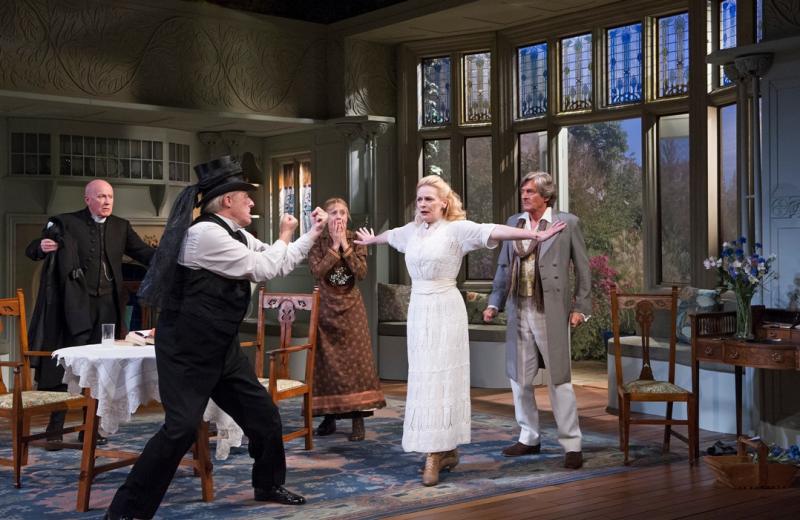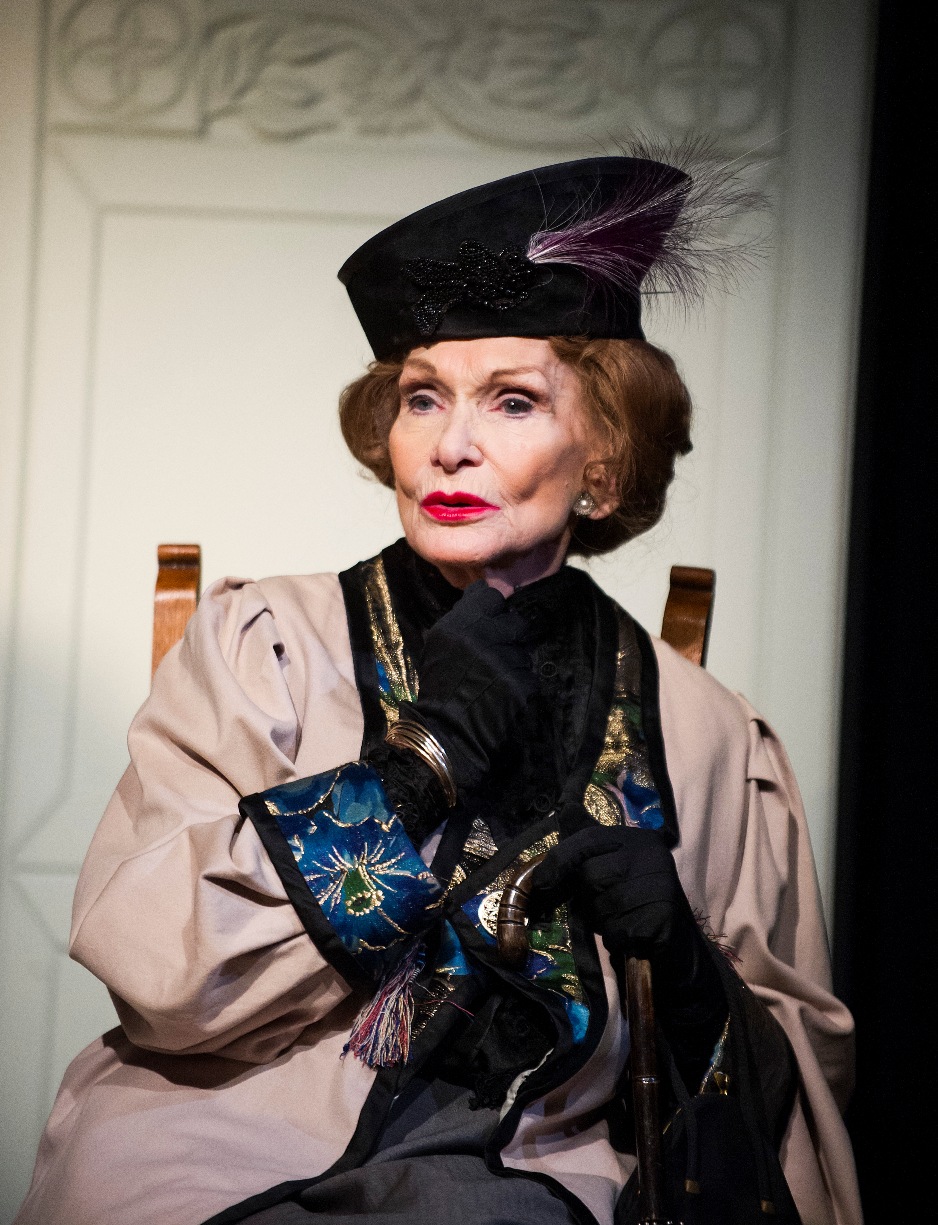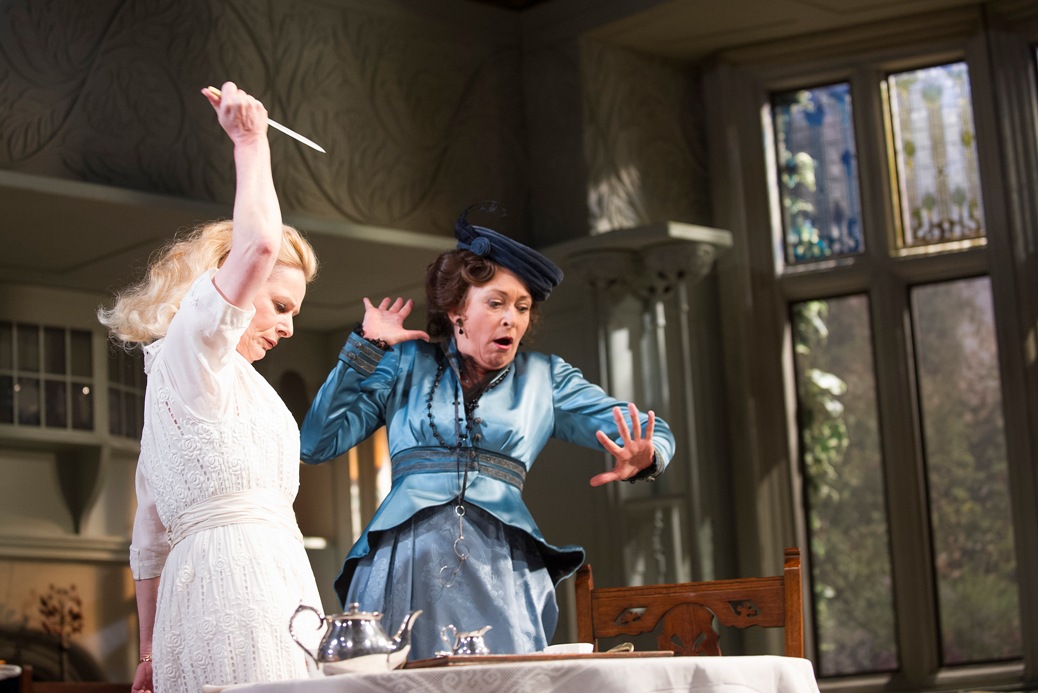The Importance of Being Earnest, Harold Pinter Theatre | reviews, news & interviews
The Importance of Being Earnest, Harold Pinter Theatre
The Importance of Being Earnest, Harold Pinter Theatre
Or the importance of doing Wilde gracefully, in sensitively handled play-within-a-play

“Some might say we’re getting too old for this sort of thing,” declares Martin Jarvis’s Jack Worthing, going off Wlldean piste. Well, we did wonder whether the reunion of Jarvis with Nigel Havers’s Algernon after 32 years might not be some sort of vanity Earnest.
It’s a more radical twist now than getting a man to play Lady B (though that was hardly conventional when I saw it done by two Australians actors playing all parts, by the veteran actor/director Otto Schenk in Vienna as a crapulous dowager in Bunbury, as they call it over there, or by Alan Ewing in a pinstripe suit still being addressed as “Aunt Augusta” in Gerald Barry’s brilliant, manic opera). I anticipated some sort of framework, and perhaps I get no prizes for being right: this “trivial comedy for serious people” is the latest five-yearly return to a beloved classic by the Bunbury Company of Players based in Morton St Cuthbert. And if that sounds like a pretext for Noises Off style foolery and chaos, it’s one of the many surprises that the local worthies do it more slickly and naturally than any cast I’ve ever seen on stage.
 Indeed, what could have been clunking transitions between now and then are fluently done, the play itself mostly as light and airy as William Dudley’s ravishingly beautiful design for an Arts and Crafts house (his models were an Ashbee home in Chelsea and Blackwell House on Lake Windermere). Hard to believe that the Bailey/Dudley partnership comes fresh from the black and smoking Globe-into-Colosseum setting for a stunning Titus Andronicus.
Indeed, what could have been clunking transitions between now and then are fluently done, the play itself mostly as light and airy as William Dudley’s ravishingly beautiful design for an Arts and Crafts house (his models were an Ashbee home in Chelsea and Blackwell House on Lake Windermere). Hard to believe that the Bailey/Dudley partnership comes fresh from the black and smoking Globe-into-Colosseum setting for a stunning Titus Andronicus.
This very desirable residence is owned by George and Lavinia Spelman – one of many ironies being that he, played with delicious understatement by Patrick Godfrey, owns half the county but plays both servants well, Merriman superlatively so. Simon Brett’s framework text is deft if inevitably obvious in its quck relay of information about the relationships between these not unsophisticated thespians, and there’s a running gag about the consumption of the cucumber sandwiches which, like all other ideas, never becomes too insistent.
We expect a hamming-up of Wilde’s text, but Bailey refuses to allow it, coaxing from all concerned a swift but never gabbled naturalness which refuses to pause as if to say – as I remember well from a footlights spoof – “Ha! Epigram” at every line. The grotesque wink to the audience of Havers as Dicky Oldfield as Algernon Moncrieff is one exception, used to cement a smooth transition. Otherwise there’s plenty of mounting hysteria – Phillips is consummate at sewing in a more or less throwaway “handbag”, which we’ve seen Lavinia rehearse near the start, within a crescendo of growing horror at Jack’s railway-station narrative.
 It’s left to Jarvis to reflect the mounting violence which was so much a part of Barry’s Wilde opera. His vocalizing of impeccable modulation and volume is matched by Cherie Lunghi’s very definite Gwendolen. If Havers, and Christine Kavanagh as Cecily, are quieter to begin with, they have their grace, charm and psychosis in a second half which leaves the framework more or less alone and rises to the challenge of the ladies’ bitchfest (pictured left) and a denouement which is, of all things, rather moving. After all, if the preposterousness of, say, Shakespeare’s tying-up in Cymbeline can be so, why not a scene in which Victorian hypocrisy is finally unmasked?
It’s left to Jarvis to reflect the mounting violence which was so much a part of Barry’s Wilde opera. His vocalizing of impeccable modulation and volume is matched by Cherie Lunghi’s very definite Gwendolen. If Havers, and Christine Kavanagh as Cecily, are quieter to begin with, they have their grace, charm and psychosis in a second half which leaves the framework more or less alone and rises to the challenge of the ladies’ bitchfest (pictured left) and a denouement which is, of all things, rather moving. After all, if the preposterousness of, say, Shakespeare’s tying-up in Cymbeline can be so, why not a scene in which Victorian hypocrisy is finally unmasked?
In this, Niall Buggy’s wonderful hairsbreadth-from-excess Canon Chasuble and Rosalind Ayres’s rather lovable Prism play as much of a part as anyone – and I’ve never laughed so much at the Carrollesque (or Gilbertian) absurdity of the stain left by the explosion of a temperance beverage in the governess’s holdall. More generally, though, the effect is one of quiet, inward and constant delight in the audience rather than any rolling in the aisles – and what could be more revelatory than that in a classic we all think we know so well?
Add comment
The future of Arts Journalism
You can stop theartsdesk.com closing!
We urgently need financing to survive. Our fundraising drive has thus far raised £49,000 but we need to reach £100,000 or we will be forced to close. Please contribute here: https://gofund.me/c3f6033d
And if you can forward this information to anyone who might assist, we’d be grateful.

Subscribe to theartsdesk.com
Thank you for continuing to read our work on theartsdesk.com. For unlimited access to every article in its entirety, including our archive of more than 15,000 pieces, we're asking for £5 per month or £40 per year. We feel it's a very good deal, and hope you do too.
To take a subscription now simply click here.
And if you're looking for that extra gift for a friend or family member, why not treat them to a theartsdesk.com gift subscription?
more Theatre
 Ragdoll, Jermyn Street Theatre review - compelling and emotionally truthful
Katherine Moar returns with a Patty Hearst-inspired follow up to her debut hit 'Farm Hall'
Ragdoll, Jermyn Street Theatre review - compelling and emotionally truthful
Katherine Moar returns with a Patty Hearst-inspired follow up to her debut hit 'Farm Hall'
 Troilus and Cressida, Globe Theatre review - a 'problem play' with added problems
Raucous and carnivalesque, but also ugly and incomprehensible
Troilus and Cressida, Globe Theatre review - a 'problem play' with added problems
Raucous and carnivalesque, but also ugly and incomprehensible
 Clarkston, Trafalgar Theatre review - two lads on a road to nowhere
Netflix star, Joe Locke, is the selling point of a production that needs one
Clarkston, Trafalgar Theatre review - two lads on a road to nowhere
Netflix star, Joe Locke, is the selling point of a production that needs one
 Ghost Stories, Peacock Theatre review - spirited staging but short on scares
Impressive spectacle saves an ageing show in an unsuitable venue
Ghost Stories, Peacock Theatre review - spirited staging but short on scares
Impressive spectacle saves an ageing show in an unsuitable venue
 Hamlet, National Theatre review - turning tragedy to comedy is no joke
Hiran Abeyeskera’s childlike prince falls flat in a mixed production
Hamlet, National Theatre review - turning tragedy to comedy is no joke
Hiran Abeyeskera’s childlike prince falls flat in a mixed production
 Rohtko, Barbican review - postmodern meditation on fake and authentic art is less than the sum of its parts
Łukasz Twarkowski's production dazzles without illuminating
Rohtko, Barbican review - postmodern meditation on fake and authentic art is less than the sum of its parts
Łukasz Twarkowski's production dazzles without illuminating
 Lee, Park Theatre review - Lee Krasner looks back on her life as an artist
Informative and interesting, the play's format limits its potential
Lee, Park Theatre review - Lee Krasner looks back on her life as an artist
Informative and interesting, the play's format limits its potential
 Measure for Measure, RSC, Stratford review - 'problem play' has no problem with relevance
Shakespeare, in this adaptation, is at his most perceptive
Measure for Measure, RSC, Stratford review - 'problem play' has no problem with relevance
Shakespeare, in this adaptation, is at his most perceptive
 The Importance of Being Earnest, Noël Coward Theatre review - dazzling and delightful queer fest
West End transfer of National Theatre hit stars Stephen Fry and Olly Alexander
The Importance of Being Earnest, Noël Coward Theatre review - dazzling and delightful queer fest
West End transfer of National Theatre hit stars Stephen Fry and Olly Alexander
 Get Down Tonight, Charing Cross Theatre review - glitz and hits from the 70s
If you love the songs of KC and the Sunshine Band, Please Do Go!
Get Down Tonight, Charing Cross Theatre review - glitz and hits from the 70s
If you love the songs of KC and the Sunshine Band, Please Do Go!
 Punch, Apollo Theatre review - powerful play about the strength of redemption
James Graham's play transfixes the audience at every stage
Punch, Apollo Theatre review - powerful play about the strength of redemption
James Graham's play transfixes the audience at every stage
 The Billionaire Inside Your Head, Hampstead Theatre review - a map of a man with OCD
Will Lord's promising debut burdens a fine cast with too much dialogue
The Billionaire Inside Your Head, Hampstead Theatre review - a map of a man with OCD
Will Lord's promising debut burdens a fine cast with too much dialogue

Comments
So often I read reviews on